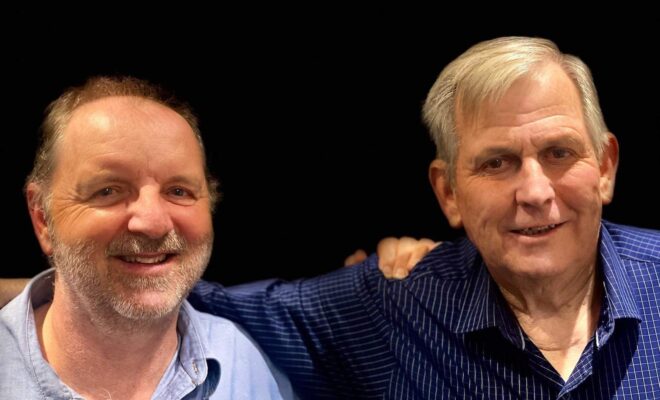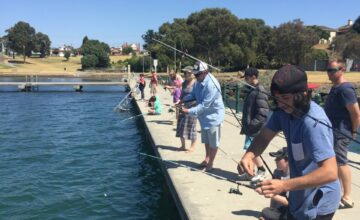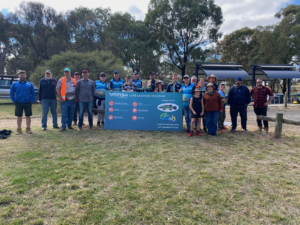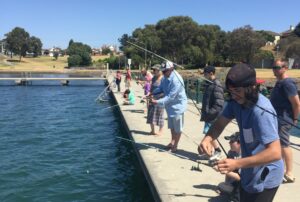February 16, 2024
Photo: (L) Anthony Forster, Fisheries Manager at the Victorian Fisheries Authority, and (R) Bob Pearce at the celebration of Kayakers Reef receiving Marine and Coastal Act consent.
Bob Pearce is the definition of a habitat hero who is making fishing better in Victoria. He is a founding member of VRFish and a member of the Albert Park Yachting and Angling Club.
Born in Albert Park, Bob grew up across the road from the beach and, from an early age, developed an affinity with the beach, the salt water and all of the things that went with it. While growing up, he recalls having easy access to the local jetties and the ability to collect prolific mussels and fresh oysters from the shallows. However, over the years, he witnessed the oyster beds and reef systems becoming functionally extinct and unable to recover naturally.
With the support of his fishing club, Albert Park Yachting and Angling Club (APYAC), Bob has been a driving force behind the shellfish reef restoration in Port Phillip Bay for over a decade.
An active fishing club established in 1909, APYAC are a Foundation Member of VRFish and have a strong history of supporting the local community. Their club rooms are located at the northern extremity of Port Phillip Bay.
Many of APYAC’s members, including Bob, can recall that shellfish reefs were once dense in northern Port Phillip Bay before much of the bay was left barren from over exploitation and dredging.
Decades of dredging in Port Phillip Bay caused havoc on the once vast shellfish reefs in the bay. The bay’s oyster and mussel reefs were home to a variety of marine species including fish, crabs, snails and sponges. However, after many years of over exploitation, pollution, introduced species and disease, these shellfish reefs virtually disappeared. Since European settlement, the bay has lost over 95% of native flat oyster and blue mussels reefs.
After identifying the terrible damage in the bay, APYAC members chose to be a part of the solution. They called on the fisheries department to see what could be done to restore the lost habitat in the bay. Following the discussion, APYAC formed a partnership with the Victorian Fisheries Authority and The Nature Conservancy to restore the bay.
The first sites for shellfish restoration were at Margaret’s Reef, off St. Kilda, and Wilson’s Spit, near Geelong. These projects are recognised as leading the way for similar shellfish reef restoration projects across the country and, indeed, success nationwide. Since the implementation of the first two sites, shellfish reef restoration has been expanded to several other sites around Port Phillip Bay, including Dromana.

In more recent news, in October 2022, the Minister for Fishing and Boating at the time, Sonya Kilkenny, announced that the Victorian Government was contributing $50,000 to a proposed new shellfish reef off Kerferd Road pier in partnership with Albert Park Yachting and Angling Club. APYAC are also contributing $50,000 to the project.
The new ‘Kayakers Reef’ will be deployed about 800 metres off the Kerferd Road pier to cater for the increasing number of kayak fishers and those in small boats. The location was chosen as it’s regarded as suitable for a shellfish reef restoration site by the Victorian Fisheries Authority (VFA) staff.
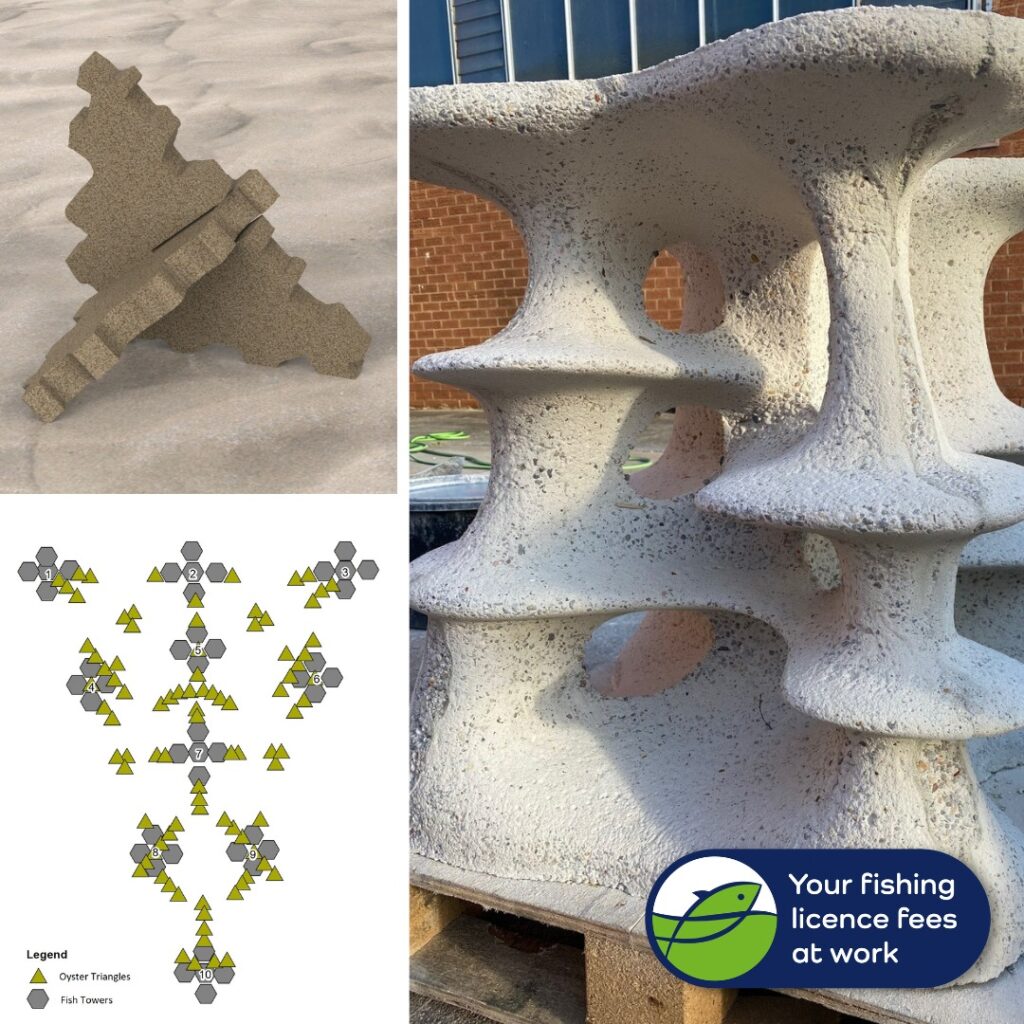
Located in about 5.4m of water, the reef will consist of 90 triangles and 45 fish towers arranged across an area of about 10x20m. The triangles will be seeded with native oysters to help restore shellfish reefs in the area.
A major milestone for the project was achieved this month with the project receiving Marine and Coastal Act consent. The Victorian Fisheries Authority have stated that the installation of the reef modules and seeding is planned to occur in spring 2024. Once complete, the GPS coordinates will be made publicly available.
It’s great news for the marine environment in Port Phillip Bay as investing in living shellfish reefs will provide an immense benefit to recreational fishers through improving fish habitat, water quality and marine diversity.
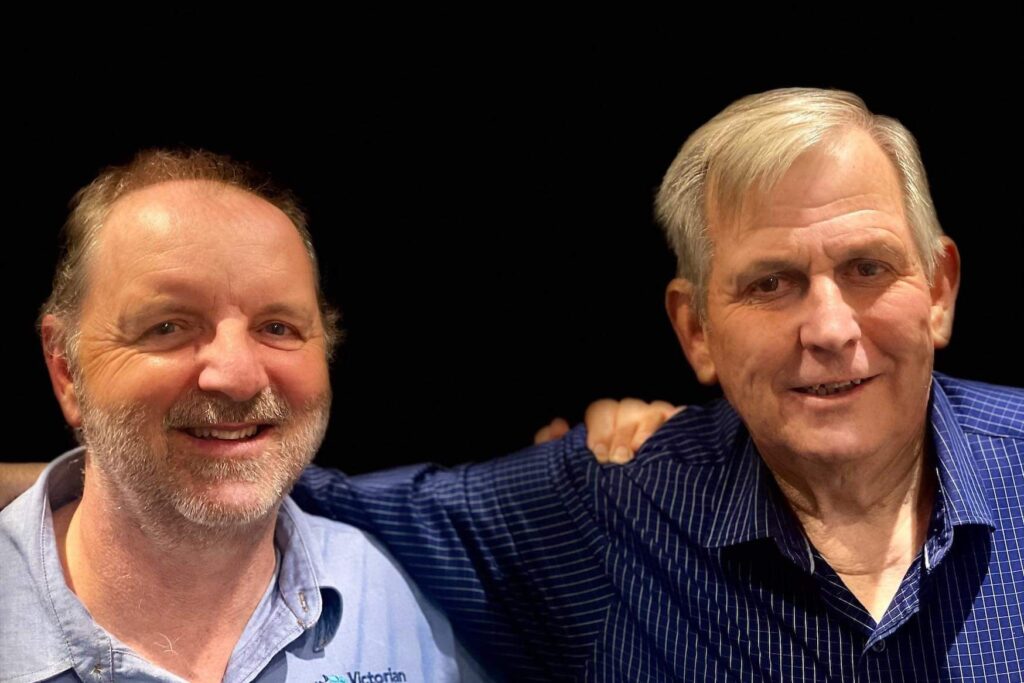
The restoration of our lost shellfish reefs is paving the way for a vibrant, healthy fishery as living shellfish reefs play a vital part in improving our marine ecosystem. A single oyster can have an incredible impact on water quality and reduce pollution levels in the water as they can filter more than 100 litres of water per day.
As a club, APYAC have been at the forefront of realising the need to protect our marine environment and the entire marine biodiversity, plus improving water quality and creating healthy habitat. This ranges from encouraging their members to only keep the fish they need to leading the way in protecting the marine environment. APYAC continues to advocate for the expansion of the restoration of shellfish reefs, raise funds and awareness about the project.
Fishing clubs are a significant part of the community and our recreational fishing sector. The unwavering passion and dedication of grassroots fishers, like Bob, and fishing clubs is commendable and they are accomplishing great things through their advocacy and drive to make fishing better.
VRFish thank Bob for being a strong advocate for oyster reef remediation in Port Phillip Bay and his involvement in making fishing better for everyone.

ALBERT PARK YACHTING AND ANGLING CLUB
Albert Park Yachting and Angling Club (APYAC) is a Foundation Member of VRFish. Learn more about APYAC on their website here.
VRFish has continually supported the development of the Shellfish Reef Restoration project in Port Phillip Bay since it was first raised as a concept by Albert Park Yachting and Angling Club (APYAC).

